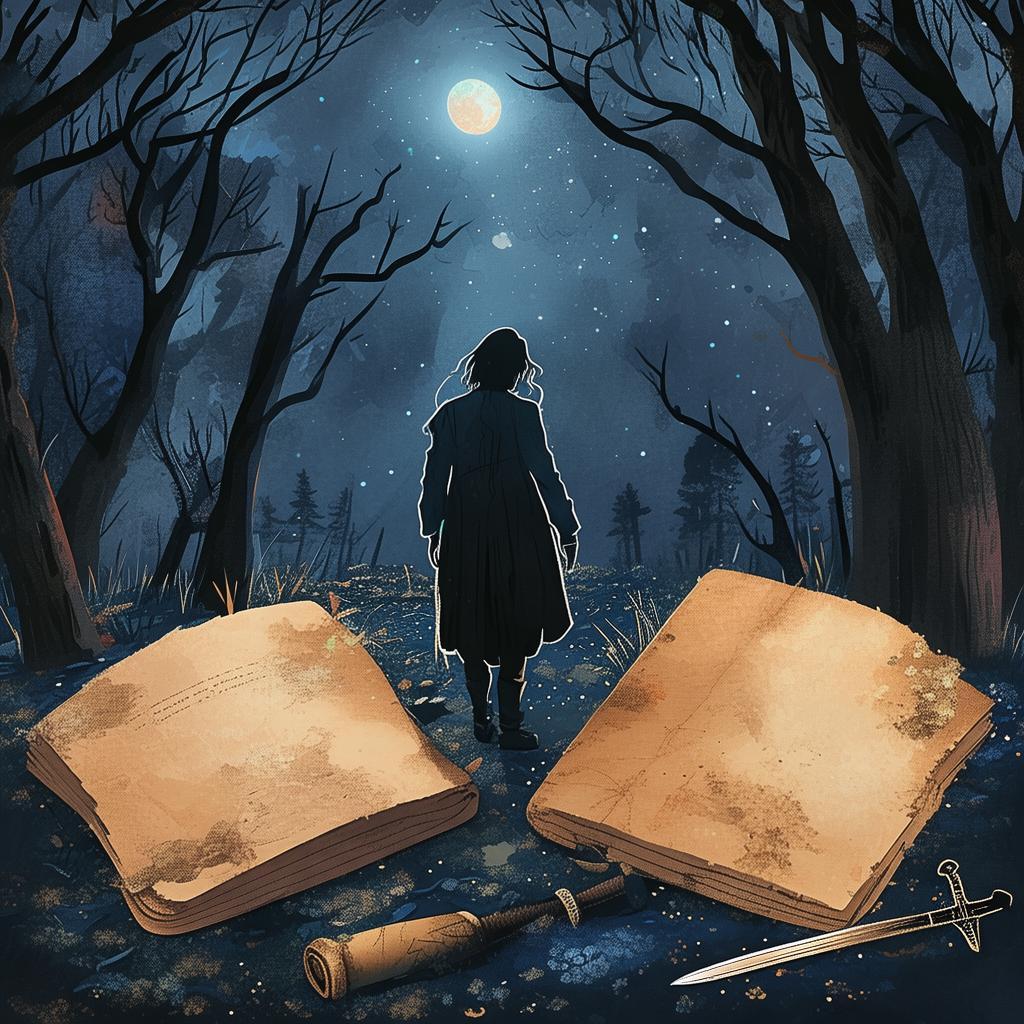The Reckoning at Appomattox
The sun dipped low in the sky, casting long shadows across the battlefield of Appomattox Court House. The once vibrant landscape now lay desolate, the scent of decay mingling with the stench of defeat. Amidst the chaos of the surrender, there stood a solitary figure, a man whose name was whispered in hushed tones among the Union soldiers—the Southern gentleman, Robert Lee.
Robert Lee had been a man of honor and pride, a soldier in the Confederate army, and a leader of men. His name was synonymous with valor and the indomitable will of the South. Yet, now, as the Civil War drew to a close, his legacy was in tatters. The Union victory had not only cost him his home and his family but had stripped him of his very identity.
He walked through the rows of defeated soldiers, a silent witness to their despair. Among them was a young lieutenant, Thomas, whose eyes met Robert's for a fleeting moment. There was a spark there, a flicker of the same pride that once burned in Robert's heart. It was a spark that would ignite a new journey for both men.
"Lee," the voice of Ulysses S. Grant called out. The Union general stepped forward, a man whose own legacy was etched with the blood of countless lives. "The terms are clear. The war is over. You have been a good soldier."
Robert nodded, a gesture of respect and defeat. "Thank you, General Grant."
"You have a future ahead of you, Mr. Lee," Grant continued, his voice firm yet tinged with compassion. "Your talents are not forgotten."
Robert's eyes softened at the words, but the weight of his past was a heavy burden. "I do not seek a future of glory," he said, his voice a whisper. "I seek a path to redemption."
Grant studied him for a moment, then nodded. "Very well, Mr. Lee. You will be released from custody, but you must promise to use your talents for the betterment of your nation."
Robert's heart raced. "I will keep my word, General Grant."
The promise was made, but the road to redemption was not clear. Robert knew he had to find a way to rebuild his life, to prove that the Southern Gentleman's legacy was not one of mere pride and defiance, but of something greater.
He began by taking up the post of teaching at Washington College in Virginia. It was there that he encountered Thomas, the young lieutenant who had watched him from afar at Appomattox. Thomas was a man of intellect and ambition, but also one burdened by the same sense of loss that Robert felt.
"You know, Mr. Lee," Thomas began one day as they walked together, "I too feel a weight upon my shoulders. I have fought for a cause that has lost its way."
Robert paused, his eyes meeting Thomas's. "Then we must walk together, and find a way to carry that weight with dignity."
Their friendship grew, as they shared their stories, their hopes, and their dreams for a future that could be better than the past. Robert taught Thomas about the South, about its beauty and its people, while Thomas introduced Robert to the ideas of unity and progress.
Together, they began to weave a tapestry of reconciliation, one that sought to bridge the divide between North and South. They spoke of peace, of rebuilding, and of learning from the mistakes of the past. It was a message that resonated with many, and soon, they had a following of students and townspeople who believed in their cause.
But the road was fraught with obstacles. Some of Robert's former comrades were skeptical of his change of heart, while others among the Union soldiers resented the notion of reconciliation. Accusations of betrayal flew thick and fast, threatening to tear apart the fragile bonds of their friendship.

One evening, as they sat by the campus' old oak tree, Thomas turned to Robert with a heavy heart. "Lee, I fear our message is too much for some to bear. They say we are traitors to our nations, that we seek to divide rather than heal."
Robert took a deep breath, his gaze steady. "Then we must stand firm, Thomas. The truth is that we are both seeking a path forward, a path that honors the sacrifices of the past while looking to a future of hope."
Their resolve was tested when a group of former Confederate soldiers descended upon the college, brandishing weapons and threatening violence. Among them was a man who had once fought under Robert's command. "Lee," he growled, "you have abandoned your brothers. We will not let you betray us so easily."
Robert stepped forward, his voice calm and measured. "I have not betrayed anyone. I have only sought to find a way to live with honor and to make amends for the past."
The man's eyes narrowed, but he was met with the unwavering gaze of Robert Lee. In that moment, the man saw the man he once admired, and for a moment, the anger in his heart softened.
"You have honor, Robert Lee," he said, bowing his head. "And so do we."
The confrontation ended with a promise to find a path forward, a path that would honor the legacies of both North and South. It was a promise that Robert and Thomas would carry with them, a legacy not of war, but of peace and reconciliation.
As the years passed, Robert and Thomas continued their work, building a community that thrived on the principles of unity and understanding. Robert's name was no longer whispered in hushed tones of defeat, but spoken with respect and admiration.
The Southern Gentleman's legacy had been rewritten, not through the valor of the battlefield, but through the strength of character and the courage to forgive. And in that rewriting, Robert Lee and Thomas found not only redemption but also a new purpose, one that would echo through the ages.
In the end, the reckoning at Appomattox was not a battle of arms, but a battle of wills, a battle of hearts. And in that battle, Robert Lee emerged not as a man of the past, but as a beacon of hope for the future.
✨ Original Statement ✨
All articles published on this website (including but not limited to text, images, videos, and other content) are original or authorized for reposting and are protected by relevant laws. Without the explicit written permission of this website, no individual or organization may copy, modify, repost, or use the content for commercial purposes.
If you need to quote or cooperate, please contact this site for authorization. We reserve the right to pursue legal responsibility for any unauthorized use.
Hereby declared.









